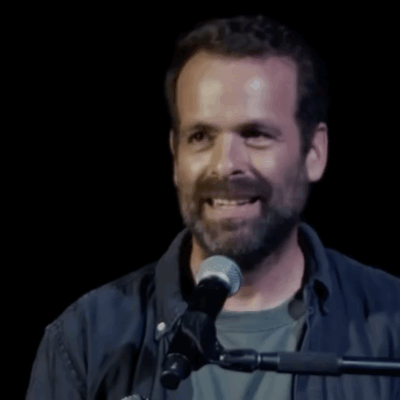Your Daily Phil: The rabbi bringing ritual objects to Jewish refugees inside Ukraine
Good Thursday morning!
In today’s Your Daily Phil, we report on an effort to supply menorahs and kosher meat to a refugee community inside Ukraine, and feature an op-ed by Kinney Zalesne and Alex Sinclair on conversation across difference. Also in this newsletter: Jennifer Mamlet, Jennifer Zwilling and Aline Kominsky-Crumb. We’ll start by recapping an interview yesterday with SBF.
Although many people (including his lawyers) considered it unthinkable, Sam Bankman-Fried actually showed up to a New York Times conference via video yesterday and subjected himself to more than an hour of grilling by Times journalist Andrew Ross Sorkin.
Bankman-Fried, popularly known as SBF, was thought of as an industry-leading cryptocurrency innovator once worth more than $20 billion, when his crypto exchange, FTX, collapsed along with his hedge fund, Alameda Research. He was also a rising political megadonor and one of the most prominent funders of a philanthropic movement called effective altruism, which aims to generate as much wealth as possible in order to leverage donations to do the greatest good for the greatest number of people.
Bankman-Fried faces allegations of improperly using $10 billion of customer funds to prop up his failed investments. He resigned as FTX’s CEO and is worth, by his own estimate, $100,000.
Bankman-Fried appeared near the end of the Times’ DealBook conference yesterday, following a litany of leaders in politics and business, from Israeli Prime Minister-designate Benjamin Netanyahu to Treasury Secretary Janet Yellen to BlackRock CEO Larry Fink.
Sorkin did not hold back in his questions, confronting Bankman-Fried with an email from someone who said they lost their life savings on FTX. He repeatedly asked Bankman-Fried if he was telling the truth, asked, “What are your lawyers telling you right now?” (in summary, not to do the interview) and suggested that the stories coming out of Bankman-Fried’s Bahamas penthouse, where he reportedly lived with colleagues, sounded “like a bunch of kids who were on Adderall having a sleepover party.”
Though he denied any intentional wrongdoing and said multiple times that he was “surprised” by what happened, Bankman-Fried acted apologetic, and spent much of the interview not making eye contact with the camera. He called what happened “a massive failure of oversight, of risk management and of diffusion of responsibility.” He said, “Clearly I made a lot of mistakes,” but said, “I didn’t ever try to commit fraud on anyone” and added that he “didn’t knowingly commingle funds.”
Near the end of the interview, he said, “??I was as truthful as I am knowledgeable to be,” and “I don’t know of times when I lied.”
Sorkin asked Bankman-Fried about an interview he had via Twitter direct message with a Vox reporter, in which, during an exchange about ethics, he wrote, “ESG has been perverted beyond recognition,” and referred to “this dumb game we woke westerners play where we say all the right shiboleths [sic] and so everyone likes us.” (Bankman-Fried said he thought it was an off-the-record conversation with a friend.)
The former billionaire maintained that his philanthropy was genuine — “I was thinking a lot about bednets and malaria, about saving people from diseases no one should die from, about animal welfare or about pandemic prevention,” he said — but added that companies including his used giving to burnish their image.
“There’s a bunch of bulls–t that regulated companies do to trend good,” he said. He added, “We thought of ourselves as legitimately trying to do good, but we also thought about what we could do to make sure that our image reflected that, and there’s a lot of just unimpactful things there.”
Earlier in the conference, other speakers described the FTX debacle in dire terms. Yellen called the firm’s collapse “a Lehman moment within crypto,” referring to the 2008 collapse of the investment bank Lehman Brothers, and said, “I remain quite skeptical” of cryptocurrency. Fink said of FTX, “It looks like there were some misbehaviors of major consequences.”
back and forth

Since Russia’s invasion of Ukraine began more than nine months ago, countless Jewish leaders have traveled to the region bearing duffel bags of medicine, clothes and hygienic products. Rabbi Irina Gritsevskaya has been one of those couriers. But along with humanitarian supplies, her bags have been filled with items she considers spiritual necessities, reports eJewishPhilanthropy’s Ben Sales.
Holiday trips: Gritsevskaya has brought stacks of haggadot for Passover, a megillah for Purim and, soon, dreidels and other goods for Hanukkah. One of her first trips into Ukraine came on March 16, as thousands were streaming the other direction across the border, to help a community on the Romanian border with a growing number of internal refugees celebrate Purim. “I went for Purim because we helped a lot with financial help, with money, with food, renting houses, evacuation,” Gritsevskaya, who was born in St. Petersburg and moved to Israel as a teenager, told eJP. “This time, we thought, there’s also food for the soul that we need to provide.”
Nationwide effort: Gritsevskaya, the director of Midreshet Schechter, a Conservative Jewish adult education seminary in Israel, has become the leader of an effort by her movement to aid Ukraine’s Conservative Jewish communities, which serve hundreds of families across five cities, and support their refugees. In total, the Schechter Institutes — her seminary’s parent organization — together with the global Conservative group Masorti Olami have spent some $400,000 on the effort, helping thousands of refugees. The country’s Conservative Jewish camp also relocated to Romania this past summer.
A growing community: But beyond making sure the refugees are safe and cared for, that aid has also gone toward sustaining a burgeoning Conservative Jewish community in the western Ukrainian city of Chernivtsi, close to the border with Romania. While it’s hard to say how much that community has grown, owing to the coming and going of refugees, community leader Lev Kleyman estimates that average synagogue attendance on Shabbat has roughly doubled — drawing 50 or 60 people to a Saturday morning service now, as opposed to 20 or 30 before the war.
culture shift
The calculus of cancellation over conversation

“In today’s fragmented and siloed world, it’s easy to stay in our own echo chambers. The list of people we ‘just can’t talk to’— or even listen to —- grows daily, and includes not just political opponents but colleagues and family members. Revulsion, not reflection, too often governs our decisions. But have we, as community leaders or individuals, stopped to parse the considerations used to calculate who we will and won’t engage with?,” ask Kinney Zalesne and Alex Sinclair in an opinion piece for eJewishPhilanthropy.
Gathering together: “Heart of a Nation, a nonprofit organization that brings together Americans, Israelis and Palestinians who want to improve their own societies, decided to do just that. Earlier this month, we gathered six American Jewish leaders for a 90-minute virtual discussion, probing whether and how they decide their “red lines” when it comes to both public and private conversations. The six interlocutors included a member of Congress, a rabbi, an author, a journalist, an activist and a professor. They varied by age, gender, politics and Jewish affiliation. But as they described their thinking about red lines, some common patterns emerged.”
Worthy Reads
Reuniting Families: The New York-based Center for Jewish History is launching the DNA Reunion Project, offering DNA testing kits for free; the effort is an attempt to reconnect Holocaust survivors with family members who may have — unbeknownst to them — survived, Deepti Hajela writes in The Associated Press: “The advent of DNA technology has opened up a new world of possibilities in addition to the paper trails and archives that Holocaust survivors and their descendants have used to learn about family connections severed by genocide, [genealogist Adina] Newman said. ‘There are times when people are separated and they don’t even realize they’re separated. Maybe a name change occurred so they didn’t know to look for the other person,’ she said. ‘There are cases that simply cannot be solved without DNA.’ While interest in genealogy and family trees is widespread, there’s a particular poignancy in doing this work in a community where so many family ties have been ripped apart because of the Holocaust, [genealogist Jennifer] Mendelsohn said. Her earliest effort in this arena was for her husband’s grandmother, who had lost her mother in a concentration camp. That effort led to aunts and cousins that no one in her husband’s family had known about.” [AP]
Prepping for Transparency: As the trend of companies providing pay transparency continues to grow, managers and supervisors have to be prepared for employees to discuss compensation with their co-workers, Roberta Matuson writes in Harvard Business Review: “In the past, it wasn’t necessary for front-line managers to concern themselves with the company’s philosophy and practices when determining employees’ pay, rewards, and benefits. Given the new pay transparency laws, this is no longer the case, as you’ll want to come across as credible when answering questions about pay. Many factors are used to determine an organization’s overall compensation strategy, including a company’s financial position, industry, available labor pool, and size of the company. It’s worth meeting with a member of your HR team to discuss how pay works in your organization so that you’re prepared to answer pay questions.” [HBR]
Around the Web
Jennifer Mamlet is now the executive vice president of the JCC Association. She previously served as the group’s chief development officer…
Jennifer Zwilling will be the next CEO of the Edlavitch DC Jewish Community Center, beginning in mid-January. She currently serves as chief strategy and campus success officer at Hillel International…
A new study of DNA taken from teeth in a 14th-century German Jewish cemeteryfound that Ashkenazi Jews have become more genetically similar over time…
Aline Kominsky-Crumb, an influential Jewish feminist cartoonist, died at age 74…
Pic of the Day

A group of Israel Defense Forces Soldiers originally hailing from the United States, Ukraine and France pose on Thursday at a “Personal Errands Day” event held by the aliyah organization Nefesh B’Nefesh.
Birthdays

Former executive vice president of Stuart Weitzman, Jane Weitzman…
Chairman and former CEO of Marvel Entertainment, Isaac “Ike” Perlmutter turns 80… NYC-based real estate mogul, he owned the New York Post from 1988 to 1993, previously served as chair of NYC’s MTA and is a noted car collector, Peter Kalikow turns 80… Executive producer of over 200 shows with more than 15,000 hours of television over a lengthy career, David E. Salzman turns 79… Singer, actress, comedian and author, Bette Midler turns 77… Comedian, actor and voice actor best known for his starring role in the animated sitcom “Dr. Katz, Professional Therapist,” Jonathan Katz turns 76… Former director of Pardes Institute of Jewish Studies, he is now the director of Yashrut, Rabbi Daniel Landes turns 72… British playwright, director and scriptwriter, Stephen Poliakoff turns 70… U.S. Sen. Rick Scott (R-FL) turns 70… Immediate past chair of the board of the Greater Miami Jewish Federation, Isaac “Ike” Fisher turns 66… U.S. District Court judge in Oregon, Judge Michael H. Simon turns 66… U.S. Sen. Gary Peters (D-MI) turns 64… CEO of Oracle Corporation, Safra A. Catz turns 61… Professor in the Department of Mathematics and Physics at the University of Cambridge, Raymond E. Goldstein turns 61… Pittsburgh-based entrepreneur, David Seldin… CEO at My Pest Pros in Fairfax County (Virginia), Brett Lieberman… Emmy Award-winning stand-up comedian, actress, producer and writer, Sarah Silverman turns 52… Rabbi of Shaarei Tefillah Congregation in Toronto, Rafi Lipner turns 49… Principal in the media and communications practice at The Raben Group, he is the author of a book on military suicides, Yochi J. Dreazen turns 46… Emmy and Peabody Award-winning director, comedian, producer, writer and actor, Akiva Schaffer turns 45… SVP of marketing and communications for Madison Square Garden Entertainment, Natalie Ravitz… Senior political correspondent at Axios, Josh Kraushaar… Writer and television producer including for NBC’s primetime series “Brooklyn Nine-Nine,” Evan Daniel Susser turns 37… English teacher at Jerusalem’s Keshet Talpaz, Shira Sacks… Principal at Magen Strategies, David Milstein… Mexican musician influenced by Sephardic brass and klezmer styles, known by his mononym “Sotelúm,” Jorge Sotelo turns 33… Becky Weissman… Israel Policy Forum Board member; Former president of the American Jewish Committee and a board member at Israel Policy Forum, John Shapiro… President of the Jewish Federation of Howard County, Rabbi Gordon Fuller…
Email Editor@eJewishPhilanthropy.com to have your birthday included.









